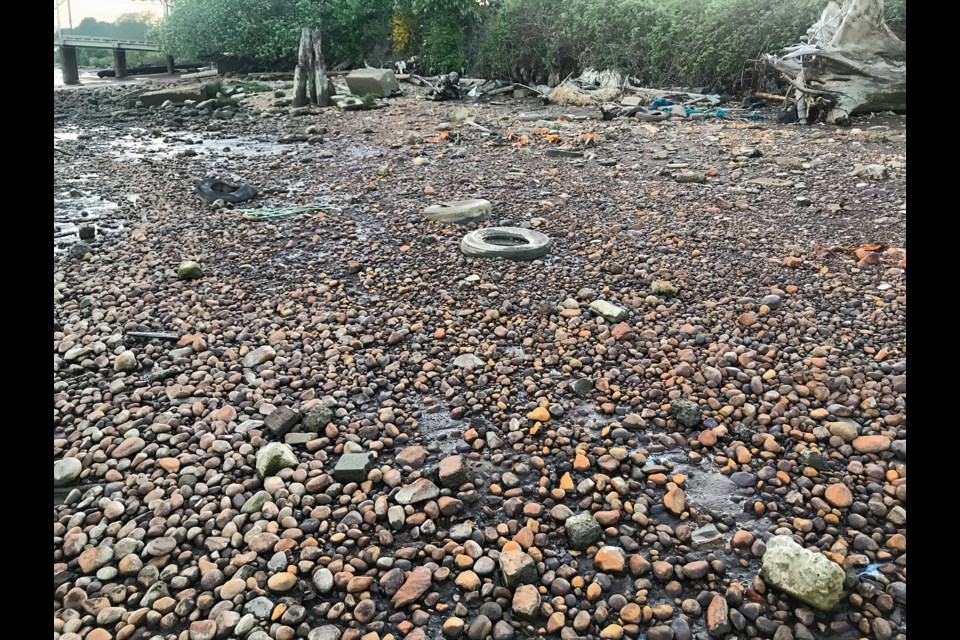The state of the old dumpsite east of Triangle Beach, where decades of decomposing metals and garbage are now being exposed by tidal action, illustrates the need for the revival of a Fraser River management program, according to local environmentalists.
It’s “not a healthy habitat” along that section of the river, said Otto Langer, chair of Fraser Voices and retired biologist with Environment Canada and the Department of Fisheries and Oceans.
“All the habitat we had along the Richmond landfill shoreline is pretty well gone, and now you’re seeing the toll of the garbage dump,” he said, adding there could be PCBs (toxic synthetic compounds) and “all sorts” of other pollutants there.
The City of Richmond is currently “looking into the situation” at the former dumpsite, according to spokesperson Clay Adams.
“This particular area is complex due to its history and location and we are looking into the situation to determine how to proceed in the best interests of the environment and the community.”
But the city, Adams said, isn’t able to comment further given an ongoing lawsuit in the area.
The site largely spans two beaches known as “8 Ball” and “The Jungle,” between No. 6 and No. 8 roads. It’s an area where there’s no wildlife, and where the shoreline is tarnished an “ugly, ghoulish kind of orange colour,” Richmond resident Steve LaRocca told the Richmond News last month. Puddles of oil from gear boxes and motors splatter the beach, while old tires and decayed cars emerge from the sand.
The site was home to what was likely one of the “messier” landfills in Western Canada, particularly between the 1960s and 1980s, said Langer.
“They let everybody dump whatever they wanted into what was the old Richmond bog. Even Canadian Pacific Airlines was dumping oil on the site, if you can believe it.”
Pollution charges were laid against the landfill in the late 1970s, Langer said, and Environment Canada issued a cleanup order under the Fisheries Act.
Calls for FREMP 2.0
However, the former landfill isn’t the only site of concern along the river, according to city Coun. Michael Wolfe.
In a series of trips in his motorized rowboat around Richmond over the past year, Wolfe said he’s come across industrial sites where sections of the structure are falling away into the river. There’s also the city’s ongoing problem of illegal dumping.
“It’s just remarkable, the scale (of stuff) that’s passing through our waterways, our estuary, and there’s very little being done to capture it,” said Wolfe.
Further complicating the issue is the fact all three levels of government have jurisdiction over various portions of the river or shoreline, Wolfe added.
Both Wolfe and Langer said they would like to see a revival of the Fraser River Estuary Management Program (FREMP), which was terminated in 2013 after the Harper Conservative government stopped funding it.
“(FREMP is) something that will be needed...but it’s not being worked on by the agencies that really have the responsibility to do that,” said Wolfe.
The program, formed in the 1980s, was designed to coordinate decision-making on conservation and development along the Fraser River, linking federal and provincial agencies, municipalities, port authorities, regional districts and First Nations. Its mandate was later expanded to include the Burrard Inlet.
“(Right now) it’s basically a hodgepodge collection of who wants to do what, where… And so things are a little bit out of control,” said Langer. “Where’s the plan for restoration of the estuary, where’s the plan for protection, where’s the enforcement program? We were better off 30 years ago than we are right now.”
FREMP established where industry could, and could not, develop along the river, while a three-zone colour-coding system helped protect against habitat loss. For example, zones in red couldn’t be developed as the habitat there was too important.
When the program was dismantled, the Vancouver Fraser Port Authority was tasked with coordinating project review applications.
“We have to look at what we did in the past – what we did well and what didn’t work – and have a new FREMP, and head off in a better direction,” said Langer. “We were able to show back then that there was cooperation, and people could sit around the same table and work together.”
Wolfe, meanwhile, said he hopes Richmond can also become a leader in cleaning up the river.
“Be it filtering, monitoring, more regular beach cleanups, having ways to skim things off the surface (of the river)… I think we should be finding ways to get more funding and more local jobs to help assist with this ongoing problem.”



